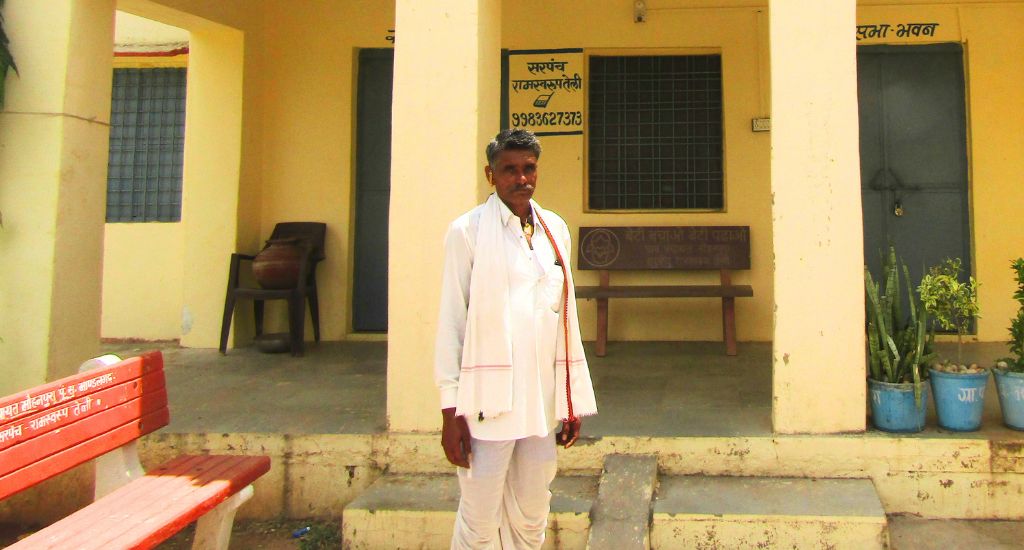
Have you heard of Rajasthan’s mobile baba?
A middle-aged villager learns digital skills and teaches others, and uses digital tools to get his villagers the social welfare aids they are entitled to, earning himself the name of mobile baba.

A middle-aged villager learns digital skills and teaches others, and uses digital tools to get his villagers the social welfare aids they are entitled to, earning himself the name of mobile baba.
What does an adolescent in Swarooppura village in Rajasthan do if she wants to learn to surf the internet? She asks ‘mobile baba’.
What do villagers do if they want information about the government’s social welfare schemes? They ask mobile baba.
Mobile baba is another villager just like them. But he chose to equip himself with skills – digital skills in particular – to help villagers get their entitlements.
Swarooppura village in Mandalgarh tehsil of Bhilwara district is home to 101 families with a total population of 433 people, comprising 234 men and 199 women, as per the 2011 census.
The village has a lower literacy rate compared to Rajasthan, with only 28.88 percent literacy recorded in 2011, as opposed to the state’s average of 66.11 percent. Male literacy is at 45 percent, whereas female literacy stands significantly lower at 9.58 percent.
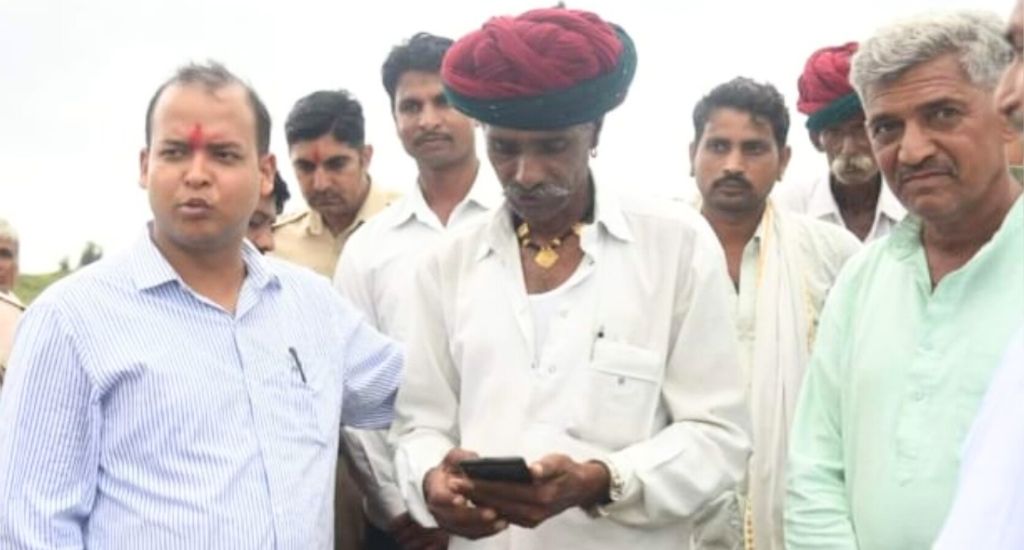
The community sustains itself through agriculture, projects under the Mahatma Gandhi National Rural Employment Guarantee Scheme (MGNREGS) and livelihoods related to livestock management.
The villagers were ignorant about the potential of their pasture land and they were not aware of the social welfare schemes being implemented by the government.
Also Read: Mobile apps aim to take venom out of snake bites
The dusty road from Swarooppura to its panchayat Mohanpura has never seen public transport. The only means to travel to the panchayat office for any big or small issue is on foot or one’s own vehicle. This makes it difficult for the villagers, especially women, to visit the panchayat and seek help or information.
Shankar Lal Gurjar, one of the villagers, chose to bring about change.
Shankar Lal Gurjar is a ward member of Ward IV in Swarooppura and assistant chief of the Mohanpura gram panchayat. A middle-aged man with grown-up children and an average income, Gurjar chose to work for his village rather than settling down and taking things slow.
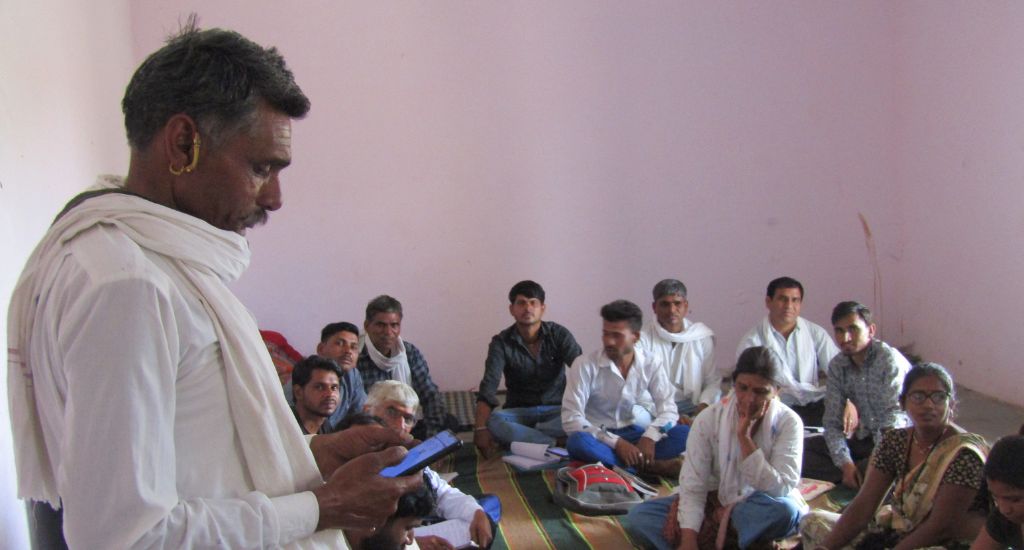
He had a youthful energy and a keen inclination toward learning new things and helping people. His progressive mindset found resonance with the Foundation for Ecological Security (FES), a non-profit organisation, and started working in the area.
A man who had never gone to school, Gurjar made the bold decision to enroll in night classes for adults, embarking on a journey to attain literacy. He eagerly participated in training sessions provided by FES on Panchayati Raj Institution (PRI), livelihood, and tools and technology, driven by his desire to assist villagers to enjoy the features of social benefit schemes.
While he sought guidance from FES staff, he also proactively engaged with panchayats to access digital applications and information. Learning to navigate websites like Jan Soochna Portal, he mastered accessing beneficiary data for various schemes, such as Public Distribution System (PDS), Indira Aawas Yojana, Vriddha Pension and Bhunaksha.
Gurjar’s use of technology has been of help to many villagers. Nauli Devi Gurjar, a resident of Swarooppura, remembers being very worried when she didn’t get her wages for MGNREGS work.
Also Read: Women use mobile phones to maintain land records
“I can’t forget how worried I was when even after working for 30 days, I didn’t receive any payment for my work,” she recalled.
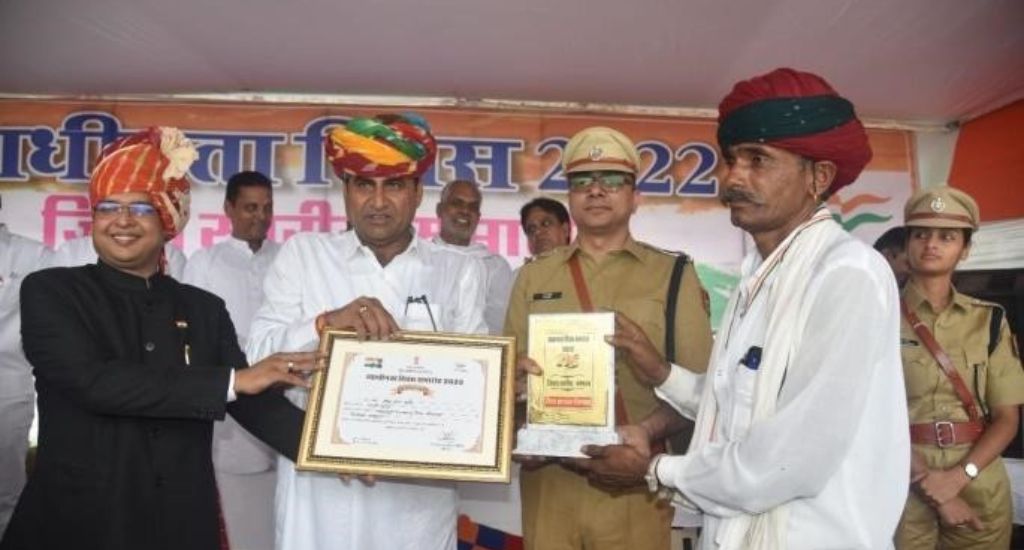
Acting immediately, Gurjar identified an error in her Aadhar card number, because of which the payment was being credited to the wrong account. Within a week, the issue was resolved, a remarkable feat compared to previous delays, since women had to sacrifice their day’s work earlier to go to the panchayat office.
In the same way, with the use of technology, Gurjar ensured that villagers who were entitled to old age pensions received the same without any delay.
In 2022, when crops were damaged in the aftermath of the heavy rainfall, he helped 25 farmers report their losses within 72 hours, enabling them to seek compensation through the crop insurance scheme.
Serving as the chairman of the Pasture Land Development Committee in his village, Gurjar has acquired proficiency in operating technical tools such as Composite Landscape Assessment and Restoration Tool (CLART) and Groundwater Monitoring Tool (GWMT) developed by FES for conservation work, using his smartphone.
Engaging actively in planning soil moisture conservation efforts in the village, he oversaw the implementation of various projects. These include the construction of contour trenches and check dams on 20 hectares of common land, the protection of 60 hectares of common land through stone boundary walls, and the planting of 4,000 saplings.
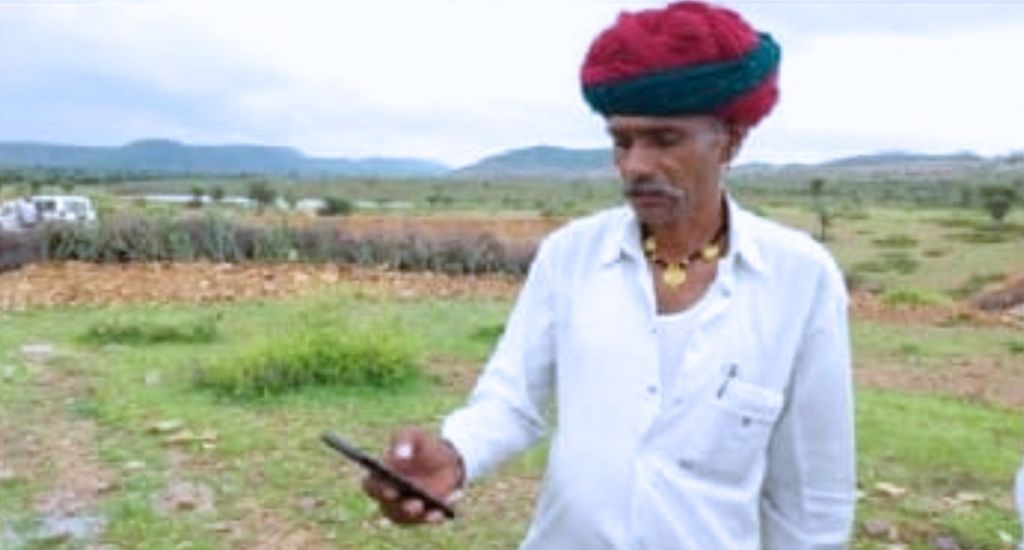
Because of the water conservation measures, the village has successfully conserved over 50 lakh litres of water in the common land.
Also Read: How to spread technology rapidly among the poor?
As a result of these initiatives, the biomass in the common land has significantly improved, rendering Swarooppura self-sufficient in fodder. Moreover, the village institution is set to earn an income of about Rs 5000 through the sale of fodder from the commons, contributing to the village’s economic sustainability.
Gurjar is known as mobile baba in the locality since he is not only good at digital skills but also teaches others the same. He teaches adolescents in the village to browse and get the necessary information from the internet. He helps the villagers access the appropriate sites to get knowledge about various social welfare schemes.
He stays updated with all the news using news apps and ensures timely dissemination of relevant information to villagers. His wife finds his dedication to assisting villagers commendable, according to him – indicating her support for his work.
Shankar Lal Gurjar, the ‘mobile baba’, envisions a community where no one is left behind because of a lack of access to information. Rightfully, the local administration and the district collector invite him often, to be the ambassador for skill transfer in this digital era for a progressive change where the mobile becomes the tool for sabka saath sabka vikas (collective efforts for inclusive growth).
Harshal Mankar is the Assistant Project Manager at FES, Rajasthan.
The lead image pictures Gurjar, who uses his elected position at Mohanpura panchayat to the benefit of villagers in Swarooppura.